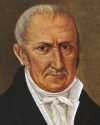
On 18 Feb 1745, Alessandro Volta was born. He's important enough in the history of science to be in just about every physics textbook! Before starting on his Nobel Prize-winning Oil-Drop experiment, Robert Millikan, as many professors have, co-authored a textbook of physics.
A novel feature of his book is that each full-page picture of historic scientists - including the picture of Alessandro Volta - had an interesting border, in which the decoration was tiny diagrams of classic student experiments.
Sadly, the book gives no key to these diagrams. So today's feature is a challenge. Look at the illustration and see how many of these you can recognize!
See how many you can figure out. Some are easier than others. Then use the email Reply, or website Feedback, to send your ideas the the Webmaster. (Or the ideas of the students in your science class if you teach.)
Go ahead. Have fun!
Or, you might be interested to look at this picture of the monument to Volta unveiled (about a half-century after his death) at Pavia in 1878 as a memorial to his work.

On 18 Feb 1745, Alessandro Volta was born, an Italian physicist who invented the electric battery (1800), which for the first time enabled the reliable, sustained supply of current. Today's book pick is: Volta: Science and Culture in the Age of Enlightenment, by Giuliano Pancaldi. Providing fascinating details, many previously unknown, Pancaldi depicts Volta as an inventor who used his international network of acquaintances to further his quest to harness the power of electricity. This is the story of a man who sought recognition as a natural philosopher and ended up with an invention that would make an everyday marvel of electric lighting.
Further, Pancaldi considers the voltaic cell, or battery, as a case study of Enlightenment notions and their consequences, that would include the emergence of the “scientist” at the expense of the “natural philosopher.” Thus, this book is both an absorbing biography and a study of scientific and technological creativity, this book offers new insights into the legacies of the Enlightenment while telling the remarkable story of the now-ubiquitous battery.
It is available from Amazon, typically about New from $42.57. Used from $21.00. (As of earlier time of writing - subject to change.)
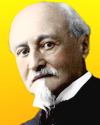 | Let us hope that the advent of a successful flying machine, now only dimly foreseen and nevertheless thought to be possible, will bring nothing but good into the world; that it shall abridge distance, make all parts of the globe accessible, bring men into closer relation with each other, advance civilization, and hasten the promised era in which there shall be nothing but peace and goodwill among all men. |
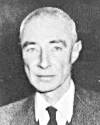 | I am become death, The Shatterer of Worlds. |
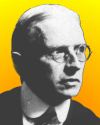 | One of the most striking results of modern investigation has been the way in which several different and quite independent lines of evidence indicate that a very great event occurred about two thousand million years ago. The radio-active evidence for the age of meteorites; and the estimated time for the tidal evolution of the Moon's orbit (though this is much rougher), all agree in their testimony, and, what is far more important, the red-shift in the nebulae indicates that this date is fundamental, not merely in the history of our system, but in that of the material universe as a whole. |
| Before you look at today's web page, see if you can answer some of these questions about the events that happened on this day. Some of the names are very familiar. Others will likely stump you. Tickle your curiosity with these questions, then check your answers on today's web page. | |
| Births | |
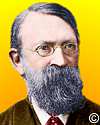 | An Austrian physicist, born 18 Feb 1838, established important principles of optics, mechanics, and wave dynamics. He introduced a number, still named for him, for the ratio of speed of object to speed of sound. Can you name this scientist? |
 | Count Alessandro Giuseppe Antonio Anastasio Volta, born 18 Feb 1745, was an Italian physicist whose invention of the electric battery (1800) provided the first source of continuous, reliable current produced by the contact of two dissimilar metals. His famous voltaic pile consisted of an alternating column of disks of silver and another metal separated by porous cardboard soaked in brine. What was the second metal he used in his voltaic pile? |
| Deaths | |
 | J. Robert Oppenheimer (1904-1967) was a U.S. theoretical physicist and science administrator, noted as a laboratory director during development of the atomic bomb (1943-45). What laboratory did he direct (1943-45)? |
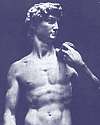 | On 18 Feb 1564, a certain Italian renaissance artist died, whose family name is “di Lodovico Buonarroti Simoni.” He advanced science by performing a number of dissections and prepared extremely accurate anatomical drawings of the human body. He was also an architect. By what name is this artist generally known? |
| Events | |
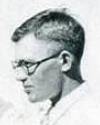 | On 18 Feb of a certain year, the planet Pluto was discovered by Clyde Tombaugh, the only planet to be found by an American astronomer. (Well, it WAS a planet when it was discovered!) In which decade was Pluto discovered? |
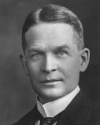 | On 18 Feb 1913, chemist Frederick Soddy introduced a new term. He suggested that different elements produced in different radioactive transformations were capable of occupying the same place on the Periodic Table, and named such species from Greek words meaning “same place.” What is this term? |
Fast answers for the previous newsletter for February 17: the halftone screen that would convert a photograph into a pattern of tiny dots • stethoscope • Remington • decade including the year 1938 • Dmitri Mendeleev.
 If you enjoy this newsletter, the website, or wish to offer encouragement or ideas, please send feedback by using your mail reader Reply button.
If you enjoy this newsletter, the website, or wish to offer encouragement or ideas, please send feedback by using your mail reader Reply button. Your click on a Facebook, StumbleUpon, or other social button on the site webpages is also a welcome sign of appreciation. Thank you for using them.
© This newsletter is copyright 2020 by todayinsci.com. Please respect the Webmaster's wishes and do not put copies online of the Newsletter — or any Today in Science History webpage. (If you already have done so, please remove them. Thank you.) Offline use in education is encouraged such as a printout on a bulletin board, or projected for classroom viewing. Online, descriptive links to our pages are welcomed, as these will provide a reader with the most recent revisions, additions and/or corrections of a webpage. For any other copyright questions, please contact the Webmaster by using your mail reader Reply button.
--
If you do not want to receive any more newsletters, Unsubscribe
To update your preferences and to unsubscribe visit this link
Executive Real Estate Business Class
-
"It was like a man with wings. It wasn't like anything you'd see on TV or in a monster movie." ...
About the publisher
Search This Blog
Blog Archive
-
▼
2021
(585)
-
▼
February
(72)
- Mary Seacole | The Spitfire | George Washington
- On This Day for February 28 - Olof Palme assassina...
- On This Day for February 27 - Chile struck by eart...
- On This Day for February 26 - Napoleon's escape fr...
- On This Day for February 25 - Ousting of Marcos in...
- Demystified: How Do Penguins Tell Each Other Apart?
- On This Day for February 24 - U.S. President Andre...
- On This Day for February 23 - Alamo besieged by Sa...
- On This Day for February 22 - Cloning of Dolly, Ge...
- Your essential guide to the Tudors | LGBT+ history...
- On This Day for February 21 - Malcolm X assassinat...
- On This Day in History by OnThisDay.com: You are n...
- February 21: The 1st Romanov Tsar, the 1st Locomot...
- On This Day for February 20 - John Glenn's orbit o...
- On This Day for February 19 - Iwo Jima invaded by ...
- 🎉 Ready for 30% Off Kids' Memberships?
- On This Day for February 18 - Pluto discovered by ...
- Newsletter for Thursday 18 February.
- Demystified: Why Does Salt Melt Ice?
- On This Day for February 17 - Vietnam invaded by C...
- Newsletter for Wednesday 17 February.
- On This Day for February 16 - Power in Cuba seized...
- Newsletter for Tuesday 16 February.
- On This Day for February 15 - USS Maine destroyed,...
- Newsletter for Monday 15 February.
- February 15: The King of Persia, the Human Genome ...
- Who was Saint Valentine?
- On This Day for February 14 - Fatwa issued against...
- Newsletter for Sunday 14 February.
- February 14: Battle of Cape St Vincent, the Teleph...
- On This Day for February 13 - William and Mary cro...
- Newsletter for Saturday 13 February.
- February 13: Baghdad falls to the Mongols, the Bil...
- On This Day for February 12 - Chile's independence...
- Newsletter for Friday 12 February.
- February 12: The Qing Dynasty Ends, The Senate Acq...
- Demystified: Why Do We Say “A Pair of Pants”?
- On This Day for February 11 - St. Bernadette's fir...
- Newsletter for Thursday 11 February.
- February 11: Margaret Thatcher's Rise to Power, Ne...
- Watch ‘Tuskegee Airmen: Legacy of Courage’
- 🇺🇸💰Your Presidents' Day Exclusive Bonus!
- On This Day for February 10 - Kasparov-versus-comp...
- Newsletter for Wednesday 10 February.
- February 10: End of the French-Indian War, HMS Dre...
- All-New Tonight: 'The Food That Built America' Sne...
- On This Day for February 9 - Calcutta restored to ...
- Newsletter for Tuesday 9 February.
- February 9: Massachusetts Rebels, the Battle of Gu...
- On This Day for February 8 - Mary, Queen of Scots,...
- Newsletter for Monday 8 February.
- February 8: Mary Stuart is Decapitated, Napoleon L...
- What did Mary Tudor think of Anne Boleyn and her o...
- On This Day for February 7 - British Invasion laun...
- Newsletter for Sunday 7 February.
- February 7: The 1st English Prince of Wales, the M...
- Newsletter for Saturday 6 February.
- On This Day for February 6 - Accession of Elizabet...
- February 6: Maximilian I and Elizabeth II Ascend t...
- Black History Month: The Tuskegee Airmen Documenta...
- On This Day for February 5 - Punic Wars ended, Han...
- February 5: Congo Taken as a Personal Possession a...
- On This Day for February 4 - Yalta Conference open...
- February 4: The Chinese Song Dynasty, World's Olde...
- Serving Up an All-New Season
- On This Day for February 3 - Fifteenth Amendment t...
- February 3: The Naval Battle of Diu, Universal Suf...
- On This Day for February 2 - Ban on African Nation...
- February 2: New Amsterdam Grows Up, the US Pays Me...
- On This Day for February 1 - Space shuttle Columbi...
- Newsletter for Monday 1 February.
- February 1: Black History Month Starts and a Day o...
-
▼
February
(72)
-
Blogroll
-
About
HistoryFact










0 comments:
Post a Comment